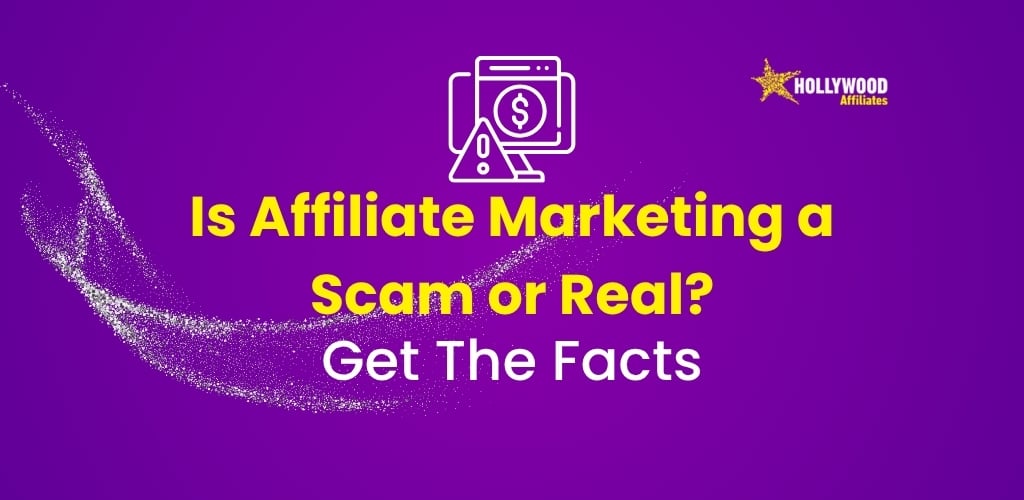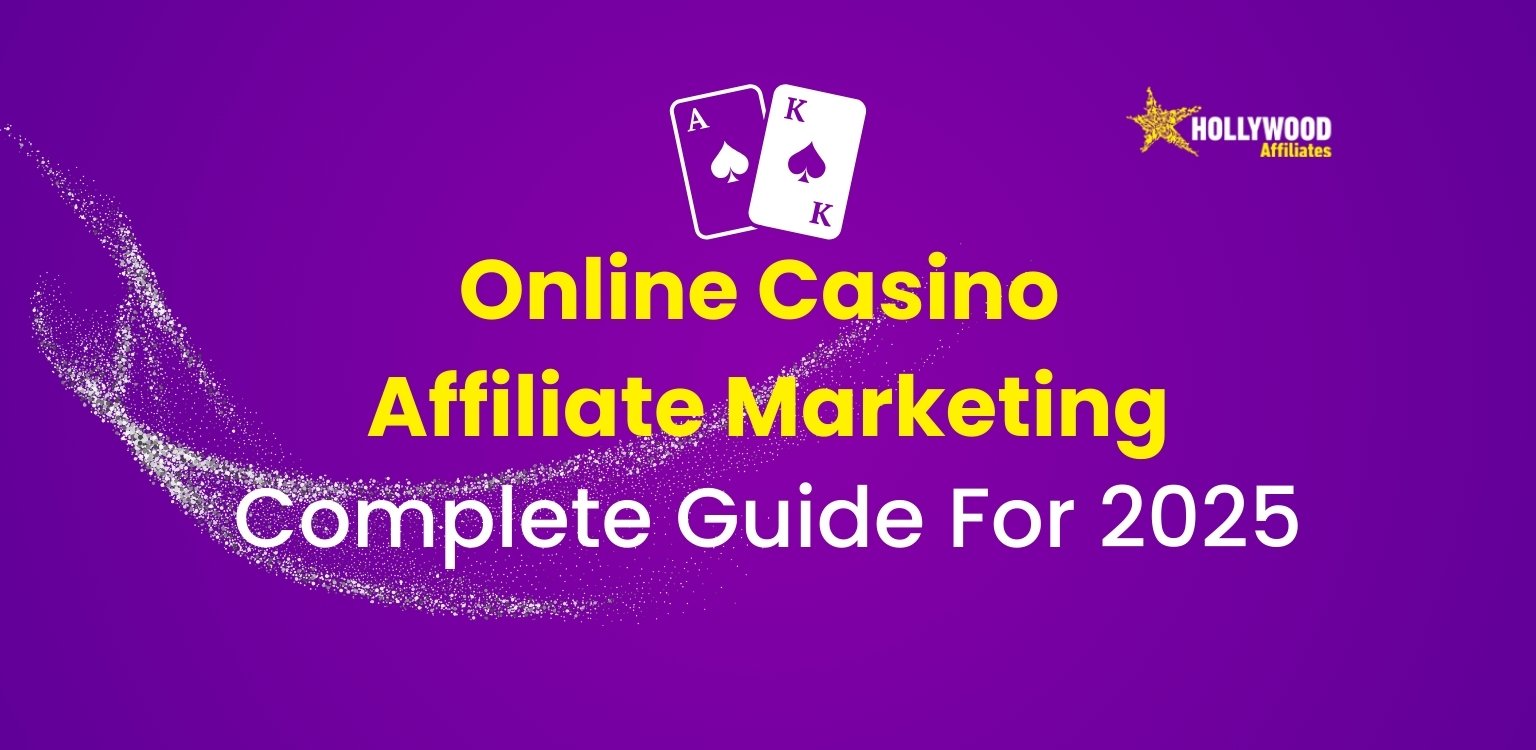How Affiliate Marketing Works Explained in Simple Terms

You’ve probably seen influencers promoting products on social media and getting paid and heard the term affiliate marketing. Now you maybe wondering, how does affiliate marketing work? Let’s unravel the mystery and explore how you can leverage this to make some money.
Table of Contents
How Does Affiliate Marketing Work?
In its simplest form, affiliate marketing is one of the easiest ways to make money online. You earn a commission for the affiliate sales that you make for other people or a company’s products or services. Basically, you are the middle-man between the company and the buyer, and you are bridging the gap between the three – you, your customer and the company (or product) that you promote.
This way of marketing has been on the rise since the boom of e-commerce and is gradually replacing many of the more traditional forms of marketing. In fact, in 2023, affiliate marketing spending in the United States reached $9.56 billion and is predicted to continue growing.
Usually, an affiliate is someone who has an online presence/ platform to promote the products to their affiliate networks. You are an ambassador for these products, so it is crucial to recommend things that you would use yourself to make them more genuine for your customers.
The best part? You never have to sell the products or services, respond to customer queries, or even ship the items. Your only role is to bring the buyer and the seller together. Affiliate marketers who are successful focus on building trust and offering helpful information. They post genuine product reviews, share informative articles and suggest products that are really helpful to people.
How do Affiliates make money?
Here’s how it works in practice.
- First, you join an affiliate program.
- Next, the company gives you a unique link to track your sales.
- Then, you share this link on your website, social media, YouTube channel, or via email.
- A potential buyer clicks the link.
- The buyer makes a purchase.
- The affiliate company records the transaction.
- The affiliate is paid a monetary commission.
Commission rates differ from business to business on the product and the agreement negotiated between the affiliate and brand.
How do Affiliate Marketers get paid?
How the affiliate is paid can vary as every seller measures sales differently and offers different affiliate commission structures. Here are the most common payment options:
- Per sale: This is the most common payment model for online sales. The seller pays the affiliate a commission for every completed sale.
- Per action: In this scenario, a commission is earned for generating a specific action, such as a newsletter signup.
- Per install: Affiliates are paid every time an app or software is installed.
- Per lead: This payment is made to get a customer to go to the seller’s website to complete an action like signing up for a trial. Lean more about cost-per-lead (CPL) affiliate marketing.
- Per click: In this instance, a commission is paid for every click on an affiliate link. There are two Pay per click concepts:
- Cost-per-acquisition (CPA): The affiliate gets paid each time the seller gets a lead, like a mailing list subscription. Here are examples of the best CPA affiliate programs.
- Earnings-per-click (EPC): This payment is based on the average earning per 100 clicks. Lean more about what EPC is in affiliate marketing.
What are the Affiliate Marketing models?
Affiliate marketing has been broken down into three categories. Here, we break down what they are to help you decide which option is best for you.
Unattached
This is basically what the word says – the affiliate marketer has no attachment or connection with the brand, product or service they are selling. This also means they do not have expertise relating to the product or service.
Generally, an unattached affiliate will reach customers on social media using an affiliate link in hopes that buyers will click it and purchase the product.
Unattached affiliate marketing doesn’t require much commitment and will generate an income without the affiliate investing in the product.
Related
Related affiliate marketing promotes products or services that relate to your existing audience. For example, you could be promoting a mascara you’ve never used, but you have an audience through a make-up blog. In this case, you would be considered a related affiliate marketer.
The benefit of this affiliate marketing approach is that you use your own traffic-generating expertise but could run the risk of recommending a lousy product and breaking your followers’ trust.
Involved
With involved affiliate marketing, the affiliate has tried the product and uses their personal experiences with the product to provide reliable information in their marketing to build trust with their customers.
Who are the Key Players?
There are three key parties involved in the affiliate marketing cycle – the seller (product creator), the affiliate (the advertiser) and the consumer (the buyer).
The Seller
The seller can be a single business owner or a large retailer that creates a product. The product can be an object or a service. The seller does not get involved in the marketing, but they can help the affiliate with support and profit from the revenue share of the sale.
The affiliate
The affiliate can be an individual or a company that sells the product or service to potential consumers through its marketing efforts. Basically, the affiliate promotes the product to the consumers. If the consumer buys a product, the affiliate receives a portion of the revenue made.
The types of affiliate marketing vary by approach, and many blend these to maximise their efforts. These are usually:
- SEO & Bloggers – Promote offers by driving organic traffic from search engines. Affiliates create content-rich websites, blogs, or review pages optimized for search engines to attract visitors.
- Social, Streamers, & Tipsters – This category includes influencers, content creators, and tipsters who promote affiliate products through social media, live streaming, and community-driven engagement.
- Media & Network Buyers – This type of affiliate marketing involves large-scale media buyers, ad networks, and agencies that use paid advertising to promote affiliate offers.
This could be a website, social media accounts, a video channel, or a blog. You are an ambassador for these products, so it is crucial to recommend things that you would use yourself. That makes it even more genuine for your customers.
The Customer
Of course, for the affiliate system to work, there needs to be a sale, and the customer is the one who must buy the product.
The affiliate markets the product or service to consumers via various online channel(s), e.g. create video reviews or tutorials and unboxings. If the consumer wants to buy, then they click on your affiliate links, which direct them to the seller’s website. Once the purchase is completed, the affiliate receives the negotiated commission.
Affiliate Marketing Success Stories
For affiliates, it’s a low-cost way to start a business that almost anyone can try. But as with anything, you need to invest time and have determination to make your efforts pay off. As affiliate marketing is growing in popularity, the market can become quite competitive.
Jacky Chou‘s journey to affiliate marketing success started in 2014 when he was still working as a consultant at Deloitte. Chou was not happy with the corporate world and began testing digital marketing tactics himself, beginning in 2014 and launching his first blog, which promoted home decor affiliate links in 2016. Chou launched Trendy Mami, a home decor blog with little capital.
He did not even write the content himself but instead made sure that the writers he hired would provide high-quality articles about home improvement topics. He specifically went after keywords with high commercial intent but lower competition – for example, “best coffee tables under $100.”
What made Chou different was his analytical approach to the business. As a consultant, he knew his stuff when it came to performance metrics and using data to optimise content. His strategy focused on:
- Keyword research with an emphasis on buyer intent rather than traffic volume
- Content that answered readers’ questions
- Working with brands that offer high commissions
- The never-ending process of trying out different affiliate programs.
The site was making $10,000 per month in passive income 18 months from launch. Scaling and diversifying instead of stopping at the first success, Chou followed the formula that had worked for him and launched other niche sites. He moved into travel, photography, and software reviews. By 2018, his affiliate site’s portfolio had been bringing in more than $50,000 per month.
He also followed the policy of buying profitable sites that had traffic and then optimising them for affiliate revenue. This strategy helped him accelerate his growth. Chou was able to achieve success in affiliate marketing by applying analytical skills in the development of content strategies. He steered clear of quick fixes, and instead, he opted to explore more long-term and sustainable approaches.
Chou made affiliate marketing work for him by treating it as a real business that requires money and growth strategies to make it successful and profitable, thereby creating a multimillion-dollar portfolio of digital assets that is still growing. While there are a number of affiliates who have been very successful in keeping their methods secret, Chou has been very generous in sharing his approaches with the public through his blog, YouTube channel, and speaking engagements.
Key Success Factors in Affiliate Marketing
You can learn from success stories when building your path to success. Top tips include:
- Select a niche market: Identify an area of interest to you and the needs of the target audience. This will enable you to develop content that will be of interest to them and to interact with the audience more authentically. If you’re not sure how to find the right niche for you, read our post on how to find the best niche for affiliate marketing.
- Explore affiliate marketing programs: The goal is to find programs that provide products or services related to your topic of interest. Look for plans with a commission structure that works for you and has reliable payouts. You can start by exploring all the affiliate programs we’ve reviewed for you.
- Design a good website or blog: It is crucial to have a proper website or social platform to post your work. It serves as your marketing center. You need to focus on creating quality content that will draw in your audience and keep them coming back. Learn how in our 2025 step-by-step guide on how to create a website for affiliate marketing.
- Produce quality content: In affiliate marketing, content is king. You should create helpful and engaging content for your audience. Try to include links to your content in other posts where they are relevant. Also, make sure to share real-time opinions and recommendations that are backed up by your experience. You can find examples of quality content on these top affiliate marketing blogs.
- Be adaptable: This is because affiliate marketing is dynamic. New patterns, technologies and strategies appear often. Stay current with the latest industry happenings and guidelines. And be willing to change your approach to meet the changes to ensure you always stay relevant. We’ve identified 5 cutting-edge affiliate marketing tactics for 2025.
Conclusion
Affiliate marketing is not a quick win, but if you are prepared to invest time and effort into your online business, the end result will be worth it. We would love to know what your experience of affiliate marketing has been. Please leave any comments or questions in the comments section. Subscribe to our newsletter for more tips and updates on how to become a successful affiliate marketer.
Frequently Asked Questions (FAQs):
Q: Does affiliate marketing work in South Africa?
A: Yes. There are a number of successful affiliate marketing programs in South Africa. Please read our blog on Top 10 Successful Affiliate Marketing Websites in South Africa [Hyperlink]
Q: How do you become an affiliate marketer?
A: Identify a niche market, join an affiliate program, create a website or blog and produce valuable content to target your audience.
Q: How do you make money with affiliate marketing?
A: Stay informed and up-to-date on what’s out there. Love what you sell and be creative. Reach out to your affiliate managers for help.
Next Up: How To Start Affiliate Marketing For Beginners (2025 Step-By-Step Guide)
Enjoyed this post? Don’t stop here—dive into our next article to keep learning, discovering, and growing your affiliate marketing game. We’ve handpicked it just for you to keep the Momentum Going.
Click here: To Start Affiliate Marketing For Beginners (2025 Step-By-Step Guide)

Ruaan Kleynhans
Senior Affiliate Marketing Specialist
Fueled by a passion for performance and precision, this seasoned professional has carved a niche in the fast-paced world of online gambling and casino marketing. With years of hands-on experience as a Key Affiliate Account Manager, he blends deep industry knowledge with cutting-edge digital marketing strategies to deliver outstanding results. Renowned for his ability to nurture VIP casino clients and harness analytics for actionable insights, he brings a data-driven mindset to every challenge.





